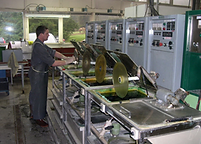
Metal Manufacturing and Surface Finishing
You've come to the right place for your surface finishing needs!
METAL WORKING
Throughout a manufacturing facility, there are various machining and metalworking operations, designed to cut, form and shape a substrate into a product. At the heart of many of these operations are Machining fluids and Metal working compounds.

Anodizing
Anodizing is an electrolytic process which converts the metal surface to an insoluble oxide coating. Anodizing provides corrosion protection, decorative surfaces, and can provide electrical and mechanical properties. We supply the chemistry and technical support for chromic acid, sulfuric acid , hard coat and PTFE (Teflon) anodizing. Our Anodizing chemistry meets Mil Specs MIL-A-8625 and MIL-A-63576, types I, II and III.


Bright dipping
Brite Dipping or Chemical polishing not only providing a luster on to base substrates, they can also remove metal oxides, heat-treat scale, discolorations, and outside metals from the surface of the substrate. The end result is a surface that is very clean and active allowing for
further processing. Anti tarnish inhibitors can also be applied.
Chem-milling
Chemical milling is the process of removing large amounts of metal by means of chemical etching. All metal types and shapes are candidates for chemical milling, especially

contoured parts which are not easily machined.
Deoxidizing/Desmutting
These acid or alkali blends in powder or liquid form are used to remove scales or oxides from designed to deoxidize and desmut surfaces after cleaning and/or etching. They are primarily used on aluminum and titanium alloys, but they also find uses with stainless steel and other metal surfaces after cleaning and/or etching. Do we want say our desmutters are available as powder and/or

liquid concentrates. They are primarily used on aluminum and titanium alloys, but they also find uses with stainless steel and other metal surfaces.
Electroplating

Provides a coating of metal by means of electrodeposition over various metal and plastic substrates. Functional coatings impart surface properties such as: solderability, wear and
abrasion, resistance, reflectivity and conductivity. Decorative coatings add visual appeal and protective qualities to parts. We have an extensive A-Z offering of electroplating processes both Eletrolytic and Electroless, Alkaline and Acid, ROHS and WHEE, Tank and Barrel.
Automotive Specifications

Whether it is Ford, GM, Chrysler or import, our suppliers have the products that meet the required specifications. Please contact us for additional information.

In-Process Cleaning and Rust Protection
In-process cleaning and rust protection can be utilized throughout the manufacturing process. Their purpose is to clean and prepare parts for a subsequent operation and to inhibit oxidation between operations, in storage or when shipped. We carry many types of in process cleaners and rust inhibitors.
Surface Finishing
Whether done in a manufacturing plant (captive) or sent out (job shop) hard surface finishing comprise a wide range of processes that enhance the surface of a manufactured part. These finishes can improve a parts appearance (decorative), or it can provide corrosion resistance, wear resistance, hardness, anti-frictional properties, thermal conductivity (functional), depending on the substrate (metal, plastic, or composite) we offer a full line of finishing processes that include:


Alkaline/Acid precleaning
ALKALINE CLEANING is a process used for removing a variety of primarily organic soils from hard surface substrates. Soils
removed by alkaline cleaning include oils, grease, waxes, fingerprints, and dirt. Alkaline cleaners are applied by either spray or immersion.
We carry liquids and powders that can either emulsify or split out soils once removed ACIDIC CLEANING is used for the removal of primarily inorganic soils from hard surface substrates. These soils include rust, oxides, scale and mineral deposits and are also applied though an immersion or spray application. There are many types of acids in our product line available.
Chemical Conversion Coatings

Chemical Conversion Coatings are used on various substrates a prepaint base, corosion protection, electrical resistance and anti friction. These coatings include Phosphates (Iron, Zinc, Manganese), Non Phosphate coatings and "Chem films"
(hexchrome, tri chrome, and non chrome). Some of the specs met include TT-C-490, MIL- C- 5541, Mil-DTL-16232.
Title. Double click me.

